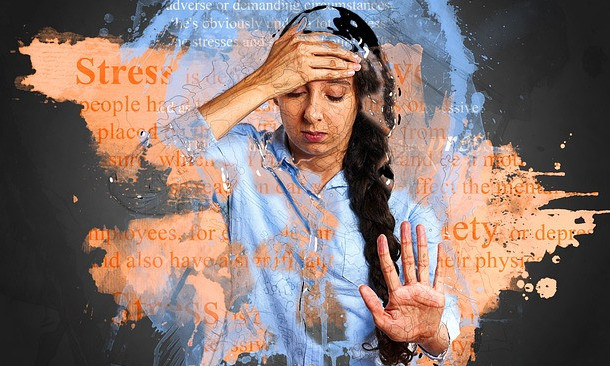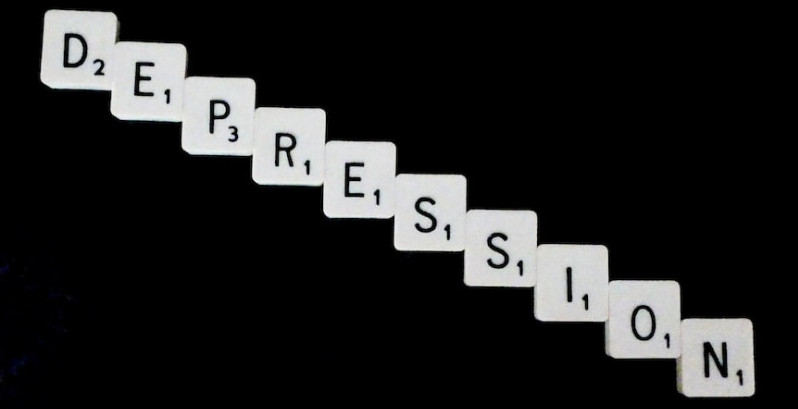Hi! Thank you so much for your insightful comment! I really appreciate your perspective as a mindful educator and meditation…

How The Stress Of Everyday Life Affects The Body And Mental Health
“God will never give you anything you can’t handle, so don’t stress.” – Kelly Clarkson
In today’s modern society, how we respond to stress can be an asset for increasing our level of performance during important events such as sporting activities, important meetings, or situations of actual danger or crisis. How we process various events will leave us feeling stressed or simply one of life’s challenges we know we can handle. To most people, ‘stress’ brings unpleasant feelings, so how the stress of everyday life affects the body and mental health?
Types Of Stress
“Tension is who you think you should be. Relaxation is who you are.” – Chinese Proverb
According to psychologists, there are three different types of stress, and each can affect our body and mind. These are:
1. Acute stress. We face acute stress several times every day when there is a challenge, a threat, something unexpected happens, or when we must do something we fear, for example: giving a speech, arguing with our spouse, getting stuck in traffic, or getting a speeding ticket. Symptoms of acute stress, such as irritability, anxiety, sweating, headache, stomach pain, or rapid heartbeat, develop quickly and do not last long.
2. Episodic acute stress. It happens when we frequently experience critical stress and can develop due to taking on too many responsibilities or being overworked. More often than not, most people with A-type personalities or people who worry constantly are prime candidates for stress-induced symptoms. Symptoms of acute episodic stress are similar to those of acute stress; however, they accumulate more often. If not managed properly, the symptoms can lead to serious health problems such as clinical depression or heart disease.
3. Chronic stress. It is constant, persists over time, and is the most damaging stress to our health. Poverty, abuse, a poor work environment, a dysfunctional marriage or family, or substance abuse can cause chronic stress. Symptoms of chronic stress can become overwhelming or debilitating. Some people may experience fatigue, changes in appetite, difficulty sleeping, headaches, or difficulty concentrating. Chronic stress left untreated for a long time can have severe consequences and lead to health problems such as insomnia, obesity, heart disease, high blood pressure, or diabetes.
Types Of Negative Effects Of Stress
“The number one root of all illness, as we know, is stress.” – Marianne Williamson
If stress becomes persistent and at a low level, all parts of the body’s stress apparatus (brain, heart, lungs, vessels, and  muscles) become chronically over- or under-activated. This has physical and emotional effects and can create positive or negative feelings that can cause physical or psychological damage over time. As a positive influence, stress can help us take action, resulting in a new awareness and an exciting new perspective. As a negative influence, it can lead to feelings of distrust, rejection, anger, and depression, which in turn can lead to health problems such as headaches, upset stomach, skin rashes, insomnia, ulcers, high blood pressure, heart disease, and stroke.
muscles) become chronically over- or under-activated. This has physical and emotional effects and can create positive or negative feelings that can cause physical or psychological damage over time. As a positive influence, stress can help us take action, resulting in a new awareness and an exciting new perspective. As a negative influence, it can lead to feelings of distrust, rejection, anger, and depression, which in turn can lead to health problems such as headaches, upset stomach, skin rashes, insomnia, ulcers, high blood pressure, heart disease, and stroke.
The Negative Effects Of Stress On The Body
“If your teeth are clenched and your fists are clenched, your lifespan is probably clenched.” – Terri Guillemets
Sometimes when we experience too much emotional stress, it results in physical disease. Such diseases are known as psychogenic diseases. In psychogenic diseases, there is no invasion of disease-producing viruses or microorganisms; the mind changes the physiology so that it breaks down.  On the other hand, diseases occur when the mind makes the body vulnerable to some diseases causing microbes or natural degenerative processes; this is a somatogenic disease such as cancer, asthma, etc. There can be various diseases caused by stress. One of the common diseases caused by stress is commonly known as high blood pressure, which is excessive and damaging blood pressure against the arterial walls of the blood vessels.
On the other hand, diseases occur when the mind makes the body vulnerable to some diseases causing microbes or natural degenerative processes; this is a somatogenic disease such as cancer, asthma, etc. There can be various diseases caused by stress. One of the common diseases caused by stress is commonly known as high blood pressure, which is excessive and damaging blood pressure against the arterial walls of the blood vessels.
Another painful disease caused by stress is Rheumatoid arthritis. It is the swelling and inflammation in various joints in the body, which, if continued in its development, can be very painful. If not paid attention to, stress can have a lot of negative consequences on the health of the body. Stress hormones can contribute to ulcers and other severe gastrointestinal problems, diabetes, and heart disease. Cancer, backache, TMJ syndrome, asthma, hay fever, tension headaches, migraine headaches, and coronary heart diseases, to name a few.
The Negative Effects Of Stress On Mental Health
“Stress is a downward spiral, and you can only overcome it with a positive perspective.” – Quote Jen Lilley
Scientists have discovered the precise mechanisms of how stress affects mental health and how the brain responds within seconds of perceiving a “stressor” by releasing chemicals that signal between nerve cells (neurotransmitters).  These include serotonin and adrenaline. As a result, stress hormones are released, mainly affecting brain areas for memory and emotion regulation. Stress has a psychological impact that can manifest in irritability or aggression, a feeling of loss of control, insomnia, tiredness or exhaustion, sadness or tears, and problems with concentration or memory. Ongoing stress can lead to other issues, such as depression, anxiety, or burnout.
These include serotonin and adrenaline. As a result, stress hormones are released, mainly affecting brain areas for memory and emotion regulation. Stress has a psychological impact that can manifest in irritability or aggression, a feeling of loss of control, insomnia, tiredness or exhaustion, sadness or tears, and problems with concentration or memory. Ongoing stress can lead to other issues, such as depression, anxiety, or burnout.
Short-term stress can lead to a mental condition called Post-Traumatic Stress Disorder (PTSD) that develops after experiencing an extremely traumatic or stressful event and is manifested by experiencing flashbacks or vivid nightmares and uncontrollable thoughts about the event. Stress can also change the brain’s structure, particularly in areas that support learning and memory, and it can affect nerve cells (gray matter) and the connections between them (white matter). It is possible that these changes, along with other factors, increase the likelihood of developing mental illness.
In Conclusion
“You must learn to let go. Release the stress. You were never in control anyway.” – Steve Maraboli

Stress is any environmental change that influences our body to react and adapt to physical, mental, and emotional responses. It’s a normal part of life, and there are good and bad forms of stress from the environment, our bodies, and our thoughts.
The human body can experience and react to stress, which can be positive (“eustress”) and becomes negative (“distress”) when it faces continuous pressure without relief or relaxation between provocations. The person becomes overworked and forms tension, leading to physical symptoms, including headaches, ulcers, high blood pressure, chest pain, and trouble sleeping. Research suggests that stress can also cause or worsen specific symptoms or diseases. Managing your stress well improves your quality of life and mental health.
Please feel free to leave a comment about how stress affects your life and your efforts to overcome it.
Or if you have more questions or need help, I am always happy to help.
Learning to let go! Boy, oh, boy! Does it make all the difference? Yes! It sure does. I was there once and was full of stress and depression. Even when good things happened to me, I was still sad or depressed. Exhaustion got the better of me and the burden of it all made me physically unwell. Seeking counsel was the decision that helped to change my life. Today, I am able to support others along their journey, as you are doing when you share these articles. Thank you for caring!
Hi Cassi!
Thank you so much for sharing your inspiring story of personal growth and the power of seeking help. Your words resonate deeply with me and remind me that it’s okay to let go and ask for help when needed. I’m grateful for your willingness to share your experiences and support others along their own journey.
Thank you for caring and for being a positive influence in the world.
Miki
Wow! your topic is amazing, and I enjoy reading it. As you mentioned, stress has too many negative effects on our bodies. Hair loss is another symptom that happens over a long period, and there isn’t anything to do and stop it. Stress is like eating junk food and easily harms our bodies, so it’s better to focus on our health and eliminate it.
Hello Liam!
Thank you so much for your kind and thoughtful comment on my post about the negative effects of stress on our bodies. I’m thrilled to hear that you found the topic interesting and informative. I completely agree that stress can negatively affect our bodies, including hair loss over time. Your comparison of stress to eating junk food is spot on – just as we try to avoid unhealthy foods for our physical health, it’s essential to focus on reducing stress for our mental and emotional health.
I appreciate your insights and your time engaging with my content. Thank you for your feedback, and I’m
grateful for your encouragement.
Miki